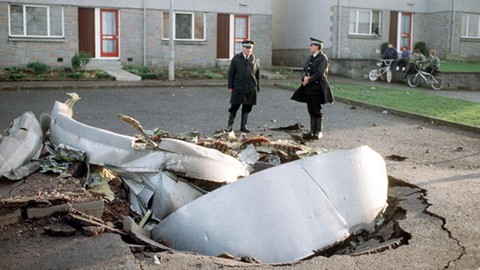
The first big magazine feature we ever wrote was about near-death experiences (NDEs). We have vivid memories of taking a prop plane from Washington D.C. to Charlottesville, Virginia, in order to interview a pair of psychologists who specialize in studying the effects of NDEs. What struck us most about their research was how the whole “walking down the long tunnel of light” experience changed folks’ priorities once they healed up. True, there was a tiny subset of NDE survivors who fell into deep depressions, having concluded that death is too terrifying to contemplate. But the vast majority became more caring, more giving people—they truly developed a newfound appreciation for the gift of life.
Our fascination with the way NDEs influence behavior continues to this day. And so when we learned of Jaswant Basuta‘s seldom-told story yesterday, we instantly knew we’d have to post about it. Basuta is commonly referred to as the 271st victim of the Pan Am Flight 103 bombing; he was ticketed for the flight, but missed boarding by a matter of minutes (though his luggage made it on the doomed plane). What’s particularly memorable about Basuta’s brush with death is that his life was essentially saved by his own minor sinfulness:
Some relatives from nearby Southall had come to see him off at the terminal and they decided to take Jaswant for a drink in the bar upstairs.
Jaswant was by no means a heavy drinker but on the odd occasion when there was cause for celebration, he was partial to a Carlsberg Special Brew.
And what with all his relatives here, today certainly was a special occasion. No doubt about it. One drink led to another. And another. And slowly Jaswant wasn’t in such a rush anymore.
“When his glass is empty, make sure you pour him another,” his brother-in-law said to the barman. The barman duly obliged.
Finally, he insisted he really must be going and it was only as he tore himself away that he realised the time was rapidly approaching flight time: six o’clock.
“Pan Am 103, New York, Gate Closing,” was flashing on the departure screen.
Please go read the whole thing. Basuta is a private man, so apparently didn’t share many details of how the experience changed him—save for the fact that it made him a more religious, more humble person. But we’re dying to know more—particularly the specifics of how he’s acted upon his stated impulse to dedicate his life to others. What has been the impact on his relationship with his wife, who believed for several hours that Basuta was among the Lockerbie victims? And how does he process the fact that his own intemperance is what ultimately saved him from death?
In the future, perhaps medical science will develop a treatment that simulates the effects of NDEs, and thus transforms thousands or millions of people into humble do-gooders overnight. Though, granted, it could be hard to find human guinea pigs willing the chance the bright, white tunnel.


Gramsci // Aug 20, 2009 at 1:08 pm
Hypnosis could be one route…
http://www.youtube.com/watch?v=R3LwvaaO1M0
Alec // Aug 20, 2009 at 1:51 pm
I think I saw on Bullshit! that NDEs can be produced artificially when people are placed under high g-forces in one of those spinning gizmos that NASA has.
Captured Shadow // Aug 20, 2009 at 2:18 pm
One friend of mine decided to become a doctor after a near drowning accident. But, I have other friends who survived near fatal car crashes, and didn’t change in any noticeable way. I suspect some aspects of the person’s personality before the event, must play a big role.
Brendan I. Koerner // Aug 21, 2009 at 9:35 am
@Alec: Yeah, that’s true–I remember writing about that in my magazine piece. If memory serves, it’s because of the pressure applied to a certain frontal part of the brain, which is suspected of playing a key role in NDEs. The problem is that such a “treatment” is sorta unsafe, at least for those who lack astronaut-levels of endurance and fitness (i.e. 99.9 percent of the population).
omellet // Aug 24, 2009 at 10:35 am
“We’re dying to know more…”
Ouch, was that a pun?
Brendan I. Koerner // Aug 24, 2009 at 10:37 am
@omellet: Heh heh…completely unintentional, believe me. The perils of not editing these posts.
BTW, that slip-up reminds me of the time I foolishly used the phrase “on life support” for a piece I wrote for the Christian Science Monitor. The metaphor was not appreciated, and left on the cutting-room floor.
Back from the Land of Shadows // Jan 12, 2010 at 1:46 pm
[…] months back, we posted about the only “survivor” of Pan Am Flight 103—a man who missed the plane by five minutes, due to the fact that he was downing pints of Carlsberg with pals at the airport bar. He spoke of […]
Near-Death Nation | Microkhan by Brendan I. Koerner // Nov 8, 2010 at 11:05 am
[…] that I have a longstanding fascination with near-death experiences and the ways in which they can alter lives. And so I was struck by this line from a recent Wall Street Journal piece about researchers’ […]
Ain’t Goin’ Out Like That | Microkhan by Brendan I. Koerner // Nov 17, 2011 at 10:04 am
[…] can only harken back to my August 2009 post about Jaswant Basuta, the man who was five minutes too late to board Pan Am Flight 103. There is obviously something […]
A Koan for Our Times | Microkhan by Brendan I. Koerner // Apr 10, 2013 at 10:41 am
[…] tale of a mass-murder survivor, which delves into one of Microkhan’s favorite issues: how a brush with catastrophic death alters the soul. The protagonist of the story, a 66-year-old barber whose co-worker was killed, is […]